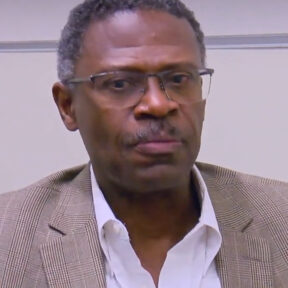
J. Lorand Matory
: Photo from Wikimedia Commons / Author of Photo: SimulationOverview
* Professor of Cultural Anthropology at Duke University
* Supporter of the Boycott, Divestment, & Sanctions (BDS) movement against Israel
J. Lorand Matory was born in 1961 in the District of Columbia. After earning a B.A. from Harvard University in 1982, an M.A. from the University of Chicago in 1986, and a Ph.D. in cultural anthropology from the University of Chicago in 1991, he was a professor at Harvard from 1991-2009. He then became the Lawrence Richardson Professor of Cultural Anthropology at Duke University in 2009, at which time he also began a six-year stint as head of the university’s Center for African and African American Research. In 2010 Matory began teaching as well in Duke’s Department of African and African American Studies, and in 2018 he taught courses in the Department of Religious Studies. In addition to his continuing professorial duties, Matory serves as the director of Duke’s Sacred Arts of the Black Atlantic Project, an online exhibition displaying the university’s Afro-Atlantic Sacred Art Collection.
Matory is a supporter of the Boycott, Divestment, & Sanctions (BDS) movement, a Hamas-inspired initiative that aims to use various forms of public protest, economic pressure, and court rulings to advance the Hamas agenda of permanently destroying Israel as a Jewish nation-state. In a September 2007 op-ed titled “Israel and Censorship at Harvard,” he criticized Harvard University’s then-president, Lawrence Summers, for portraying BDS as an anti-Semitic phenomenon. Instead, Matory argued that Summers’s criticism of BDS was itself anti-Semitic. Claiming also that supporters of the Jewish state were engaged in a conspiracy to “threate[n], defam[e], or censo[r] scholars who dare to criticize Israel,” Matory wrote that “people tremble in the fear of losing their friends, jobs, advertising revenues, campaign contributions, and alumni donations if they question Zionism or Israeli policy.” Further, he drew a parallel between Jewish property that was stolen by Nazis during the era of World War II, and the Palestinian “lands, houses, and goods” that were “stolen as a condition of Israel’s founding in the late 1940s.” On the premise that the horrors of the Holocaust had played a significant role in justifying the creation of Israel in 1948, Matory complained that the Palestinians were now being wrongly forced to “pay the price for the ghastly crime of the Germans.” “Why were the property rights of the German perpetrators sacrosanct, and those of the guiltless Palestinians adjudged an acceptable casualty?” he asked.
In a June 2008 op-ed — titled “What Do Critics of Israel Have to Fear?” — Matory lamented “the massive displacement of people that resulted from Israel’s founding 60 years ago.” The Jewish state, he elaborated, had been guilty of the “massive and ongoing theft of the Palestinians’ native land since the mid-20th century” – a theft “subsidized annually with upwards of three billion dollars from the U.S. government.” Matory also accused former Harvard Law School professor Alan Dershowitz, a Zionist, of preventing anti-Israel figures from speaking on campus. Matory further ascribed such “censorship of dissent” to “imbalances in access to money, media, and society’s administrative apparatuses.”
In a 2015 statement in support of BDS, Matory claimed that the 1948 founding of Israel was based on the “logic that aggrieved Westerners have the right to safe havens stolen from non-Westerners.” Explaining that “the oppressed often imitate their oppressors and pass the cruelty on to a more vulnerable party,” he denounced Israel for following an “evil trajectory” by allegedly treating the Palestinians in a manner akin to how the Nazis had once treated the Jews. “Israel’s impunity and the morally blind backing of the world’s greatest superpower,” said Matory, “have convinced many aggrieved parties in the world that the global post-WWII consensus against colonialism, and in favor of equal rights for all,” is nothing more than a “hollow” platitude.
In 2015 as well, Matory signed a petition encouraging the American Anthropological Association (AAA) to pass a resolution in favor of a boycott against Israeli academic institutions, on the premise that they were “complicit” in “the ongoing Israeli violations of Palestinian rights, including the Israeli military occupation of the Gaza Strip, West Bank, and East Jerusalem.” The petition charged not only that Israel’s “illegal” seven-year “siege on the Gaza Strip” was “severely restricting the movement of people and goods in and out of the territory,” but also that Palestinians were likewise “being dispossessed of their lands and livelihoods throughout the West Bank, where Israel’s separation barrier curtails Palestinian freedom of movement and education.” The resolution was defeated in June 2016, but AAA vowed that there were “other actions planned.”
Further Reading: “Meet the Man Out To Topple Harvard President” (NY Sun, 4-14-2005); “J. Lorand Matory” (Scholars.Duke.edu, CanaryMission.org); “Matory To Join Duke Faculty” (The Crimson, 9-16-2008); “Anthropologists for the Boycott of Israeli Academic Institutions” (Anthroboycott.wordpress.com); “Israel and Censorship at Harvard” (by J. Lorand Matory, 9-14-2007); “What Do Critics of Israel Have to Fear?” (by J. Lorand Matory, 6-5-2008); “Anthropology and the Boycott of Israeli Academic Institutions” (SavageMinds.org, 6-3-2015).